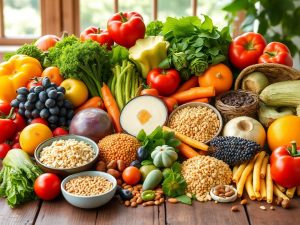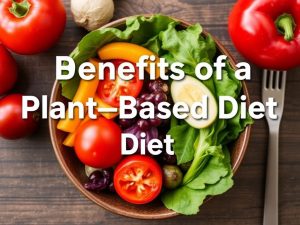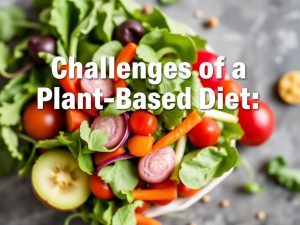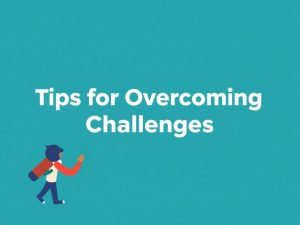Plant-Based Diets: Benefits and Challenges

Introduction :
A plant-based diet emphasizes whole, plant-derived foods like fruits, vegetables, grains, nuts, seeds, and legumes while minimizing or eliminating animal products. This approach to eating is gaining popularity due to its potential health benefits, environmental impact, and ethical considerations. However, it also comes with challenges that need to be addressed for long-term success.

Benefits of a Plant-Based Diet
- Improved Health
- Heart Health: Studies show plant-based diets reduce the risk of cardiovascular diseases by lowering cholesterol and blood pressure levels.
- Weight Management: Rich in fiber and low in calories, these diets help maintain a healthy weight.
- Reduced Risk of Chronic Diseases: Plant-based diets are associated with a lower risk of type 2 diabetes and certain cancers.
- Environmental Sustainability
- Lower Carbon Footprint: Plant-based diets use fewer natural resources and emit less greenhouse gases than diets rich in animal products.
- Reduced Water Usage: Producing plant foods typically requires less water compared to meat and dairy production.
- Ethical Considerations
- Avoiding animal products aligns with ethical concerns about animal welfare and cruelty in industrial farming practices.
Challenges of a Plant-Based Diet
- Nutritional Deficiencies
- Protein: Many people worry about getting enough protein, though it’s easily sourced from legumes, tofu, tempeh, and quinoa.
- Vitamin B12: Found primarily in animal products, B12 must be supplemented or obtained from fortified foods.
- Iron and Calcium: Plant-based sources are available but may require attention to meet recommended levels.
- Social and Cultural Barriers
- Dining out can be challenging in regions where plant-based options are limited.
- Social gatherings may not cater to specific dietary preferences, leading to feelings of exclusion.
- Cost and Accessibility
- Fresh produce and specialty plant-based products can be expensive or unavailable in some areas, especially food deserts.
- Planning and Preparation
- Transitioning to a plant-based diet requires learning new recipes and meal-planning skills.
Tips for Overcoming Challenges
- Educate Yourself
- Research nutrient-rich plant foods and consider consulting a dietitian to ensure a balanced diet.
- Start Gradually
- Transitioning can be easier by incorporating more plant-based meals over time rather than switching overnight.
- Experiment with Recipes
- Try global cuisines like Indian, Mediterranean, or Thai, which naturally include many plant-based options.
- Plan Ahead
- Meal prepping and keeping healthy snacks on hand can simplify daily choices.
- Seek Community Support
- Join online or local plant-based groups to share recipes and experiences.
Conclusion
Plant-based diets offer numerous benefits for health, the environment, and animal welfare. However, success requires addressing challenges such as nutrient intake, social situations, and food accessibility. With proper planning and resources, a plant-based lifestyle can be sustainable, rewarding, and enjoyable.




